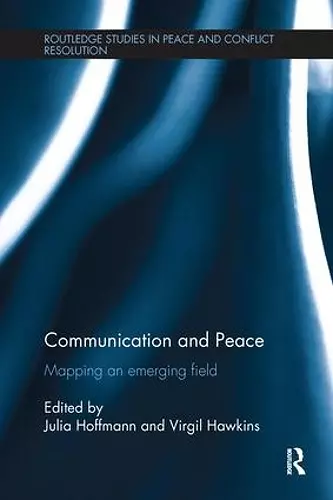Communication and Peace
Mapping an emerging field
Julia Hoffmann editor Virgil Hawkins editor
Format:Paperback
Publisher:Taylor & Francis Ltd
Published:11th Oct '16
Currently unavailable, and unfortunately no date known when it will be back
This paperback is available in another edition too:
- Hardback£155.00(9781138018044)

This book analyses the use of communication in resolving conflicts, with a focus on de-escalation and processes of peacebuilding and peace formation.
From the employment of hate radio in the Rwanda genocide, to the current conflict between Russia and the Ukraine following events in the Crimea, communication and the media are widely recognized as powerful tools in conflicts and war. Although there has been significant academic attention on the relationship between the media, conflict and war, academic efforts to understand this relationship have tended to focus primarily on the links between communication and conflict, rather than on communication and peace.
In order to make sense of peace it is essential to look at communication in its many facets, mediated or not. This is true within many of the diverse strands that make up the field of communication and peace, but it is also true in the sense that a holistic and interdisciplinary approach is missing from the literature. This book addresses this widely acknowledged lacuna by providing an interdisciplinary perspective on the field, bringing together relevant, but so far largely isolated, streams of research. In doing so, it aims to provide a platform for further reflection of the meaning of, and requirements for, peace in our contemporary world with a focus on de-escalation, conflict transformation, reconciliation and processes of peacebuilding – as opposed to conflict escalation or crisis intervention.
This volume will be of much interest to students of peace and conflict studies, peacebuilding, media and communication studies, security studies and IR in general.
‘The evidence is growing that media and communication in the 21st century really matter in shaping how and whether humans get on with each other or end up attacking and killing each other. We need really strong multi-disciplinary research, reflecting diverse approaches and perspectives, to better understand what we can do to support media that reduces or mitigates conflict and increases the chances of people getting on with each other. We don’t have anything like enough of it and this looks like a very promising and timely contribution.' -- James Deane, BBC Media Action, UK.
‘An excellent book revealing both how media contribute to violence and how they could contribute to peace; like asking "Mr President, what is the conflict underlying the violence? Mr President, what are you going to do to solve that conflict.' -- Johan Galtung, TRANSCEND International
‘To remain relevant, peacebuilding must prove itself to be media-savvy. Yet for too long the discussion on the contribution of media to peacebuilding has remained within the ranks of the converted, framed by high expectations of its positive impacts – expectations which, given that peacebuilding by its very nature permeates the whole of society, often seem exaggerated. Presenting a variety of experiences and lessons learned from the practice of peacebuilding, Hoffmann and Hawkins bring together important voices in this handbook, thus laying an essential – and a refreshingly critical – foundation for opening up this field to interdisciplinary reflection.' -- Rousbeh Legatis, Peace and Conflict Researcher & U.N. Correspondent for Inter Press Service (IPS) News Agency
‘The dynamics between peace and communication remains a hugely under-researched area of academic inquiry. This excellent collection of essays with some stellar contributors makes a timely and much-needed intervention in the field. Highly recommended.' -- Daya Thussu, University of Westminster, UK
ISBN: 9781138236592
Dimensions: unknown
Weight: 476g
346 pages